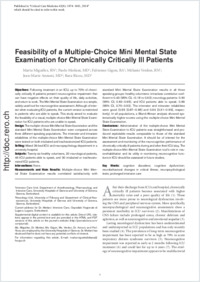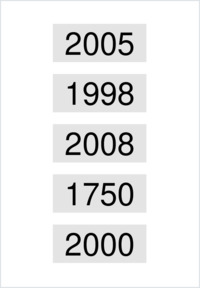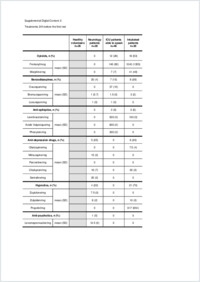Feasibility of a multiple-choice mini mental state examination for chronically critically ill patients
- Miguélez, Marta HUG, Geneva, Switzerland
- Merlani, Paolo HUG, Geneva, Switzerland
- Gigon, Fabienne HUG, Geneva, Switzerland
- Verdon, Mélanie HUG, Geneva, Switzerland
- Annoni, Jean-Marie Univ. Fribourg, Switzerland
- Ricou, Bara HUG, Geneva, Switzerland
-
01.08.2014
Published in:
- Critical Care Medicine. - 2014, vol. 42, no. 8, p. 1874–1881
English
Objectives: Following treatment in an ICU, up to 70% of chronically critically ill patients present neurocognitive impairment that can have negative effects on their quality of life, daily activities, and return to work. The Mini Mental State Examination is a simple, widely used tool for neurocognitive assessment. Although of interest when evaluating ICU patients, the current version is restricted to patients who are able to speak. This study aimed to evaluate the feasibility of a visual, multiple-choice Mini Mental State Examination for ICU patients who are unable to speak.Design: The multiple-choice Mini Mental State Examination and the standard Mini Mental State Examination were compared across three different speaking populations. The interrater and intrarater reliabilities of the multiple-choice Mini Mental State Examination were tested on both intubated and tracheostomized ICU patients.Setting: Mixed 36-bed ICU and neuropsychology department in a university hospital.Subjects: Twenty-six healthy volunteers, 20 neurological patients, 46 ICU patients able to speak, and 30 intubated or tracheostomized ICU patients.Interventions: None.Measurements and Main Results: Multiple-choice Mini Mental State Examination results correlated satisfactorily with standard Mini Mental State Examination results in all three speaking groups: healthy volunteers: intraclass correlation coefficient = 0.43 (95% CI, –0.18 to 0.62); neurology patients: 0.90 (95% CI, 0.82–0.95); and ICU patients able to speak: 0.86 (95% CI, 0.70–0.92). The interrater and intrarater reliabilities were good (0.95 [0.87–0.98] and 0.94 [0.31–0.99], respectively). In all populations, a Bland-Altman analysis showed systematically higher scores using the multiple-choice Mini Mental State Examination.Conclusions: Administration of the multiple-choice Mini Mental State Examination to ICU patients was straightforward and produced exploitable results comparable to those of the standard Mini Mental State Examination. It should be of interest for the assessment and monitoring of the neurocognitive performance of chronically critically ill patients during and after their ICU stay. The multiple-choice Mini Mental State Examination tool’s role in neurorehabilitation and its utility in monitoring neurocognitive functions in ICU should be assessed in future studies.
- Faculty
- Faculté des sciences et de médecine
- Department
- Médecine 3ème année
- Language
-
- English
- Classification
- Medicine
- License
-
License undefined
- Identifiers
-
- RERO DOC 211448
- DOI 10.1097/CCM.0000000000000342
- Persistent URL
- https://folia.unifr.ch/unifr/documents/303800
Other files
Statistics
Document views: 187
File downloads:
- pdf: 227
- Supplementary material: 116
- Supplementary material 2: 132


